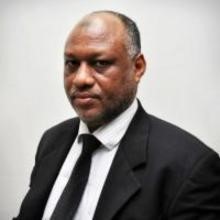Invited Speaker

Dr. Elsadig Musa Ahmed, Professor
Economics Unit, Faculty of Business, Multimedia University, MalaysiaSpeech Title: Big Data Analytics Implications On Central Banking Technological Progress
Abstract: Purpose: This paper examines big data analytics implications on the technological progress of the central banking financial system.
Design/methodology/Approach-A digital technological progress framework and model developed to examine the economy's aggregate supply by including the monetary policy, big data analytics, pollutants emissions as independent variables, and the economy's aggregate demand as a moderating variable in a modified extensive growth theory framework and model to calculate the productivity indicators and the total factor productivity (TFP) as the central banking technological progress that combined the mentioned variables qualities contribution. Besides, data analytics positive externalities and the negative externalities such as data analytics shortcomings as undesirable unpriced output in the form of cybersecurity and pollutants' emissions among other proxies are internalized in the framework and the model to integrate the digital technology innovation with digital technology shortcomings and climate change.
Findings-The significant contribution of this study has modified the fundamental findings of Nobel Prize Laureates' research findings (Nordhaus and Romer, 2018) to integrate innovation, digital technology shortcomings, and climate change in the form of green technological progress (green productivity) as well as existing studies in developing framework and model to measure the digital technology indicators via big data analytics such as digital technology positive externalities and negative externalities that include cybersecurity shortcomings and negative externalities generated by pollutants' emissions. The role of these externalities on long-term sustainable economic growth has been ignored by several past studies undertaken in these areas.
Originality/Value-This modified extensive theory framework and model in a significant method articulate the technological progress issues and sustainable economic growth as one of the most critical sustainable development and long-run economic growth dimensions in the central banking financial system functions to manage the economy's aggregate supply and demand.
Keywords: Central Bank, Aggregate Supply and Demand, Big Data Analytics, Machine Learning, Artificial Intelligence, Financial System, Technological Progress, Externalities
Biography: Dr. Elsadig Musa Ahmed is a Professor of Economics and Technology Management at Multimedia University (MMU), MMU Senate member, Students’ disciplinary committee and Board of Postgraduates (2015-2021). Coordinator for Post Graduate programs of the Faculty of Business (March 2006-April 2014), Chairperson of Center for Globalization and Sustainability Research (CGSR) (March2009-April2014), Multimedia University (MMU), Melaka Campus, Malaysia, member of Research and Development, research grants panel and the Institute of Postgraduate Studies (IPS) Coordination Committee (ICC) MMU. He is currently teaching Advanced Research Methodology, Entrepreneurship and Commercialization, and Economics for Managers at the postgraduate level and economic subjects at the undergraduate level.
His research interests include development economics, productivity analysis, Digital Economy (knowledge-based economy), productivity and environment (green productivity), Bioeconomy, Islamic finance and microfinance, Poverty, economic growth, (environment, tourism) and Entrepreneurship. He is the book's author (Green Productivity: Applications in Malaysia’s Manufacturing) in 2012. He has published more than 100 publications in international refereed journals and presented several papers at conferences. He supervised and produced 14 PhD, 4 DBA, 3 Masters, and 8 MBA Theses. Currently, supervises several students at Doctor of Philosophy (PhD.), Master of Philosophy (MPhil) and MBA project, undergraduate final levels. In terms of research grants he received 5 external projects in ICT and Economic Growth, Foreign Direct Investment Spillover Effects from the Malaysian government, and Mobile Banking for Microfinance from the Islamic Development Bank (IsDB), Jeddah KSA. He examined several PhD theses from Malaysian Universities, Indian Universities, and other countries. I have been appointed as auditor, assessor, and editorial board member for several programmes, journals, conferences, and professorial positions. He has been appointed as a panel review of the Malaysian Ministry of Education research grants and reviewer for the IsDB proposals for postdoctoral and PhD scholarships. In terms and training, he conducted several workshops and public lectures not limited to writing research grants proposals, postgraduate thesis writing, Writing scientific papers for publishing in Scopus and WoS indexed journals, leadership, and performance analysis appraisal in Malaysia, KSA, and Sudan.
He is the leader of the Economic Planning Forum and Research skills Workshops of Sudanese researchers’ initiatives. A member of The Council for Sudanese Experts and Scientists Abroad, World Economics Association, World Assembly of Youth (WAY), Arab Science and Technology Foundation (ASTF), World Academy of Sciences, Engineering and Technology (WASET), Scientific and Technical Committee on Humanities and Social Sciences, World Association for Sustainable Development (WASD), Sudan Knowledge and several associations. He is an editorial board member and reviewer for various international journals and conferences such as (Economic Modelling, Journal of Productivity Analysis, Applied Economics, Journal of Information and Knowledge Management, Telecommunications Policy). He was awarded the Outstanding Reviewer in the 2021 Emerald Literati Awards, Emerald Publishing, UK, best paper award at XXth Conference of CEDIMS, Laval University, Quebec, Canada in November 2010, and the academic staff and excellent research awards of Multimedia University several times.
